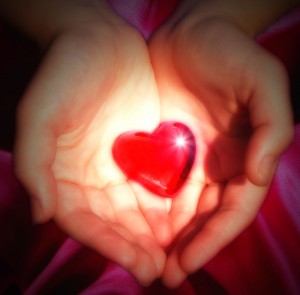Love Sadhana Part 1: Unconditional Love ~ Chris Kiran Aarya & Maya Devi Georg
 Some people hear the term unconditional love and snicker.
Some people hear the term unconditional love and snicker.
They think that its all the stuff of a teenage girl’s fantasy, with visions of Cinderella, 16 Candles, or Pretty Woman. Here the woman is rescued by the knight in shining armor. There are certain types of men who relish the role of rescuer, feeling powerful in the process. There are also certain types of women who want to be rescued. These roles rescue both from the drudgery of their lives. In fiction and fantasy, the concept is romanticized and distorted.
Some see the reality of unconditional love as the roles fulfilled by our self-sacrificing mothers and or our loyal and devoted pets. Others as a situation where you do whatever you want and a person will still love you, or as a self-sacrificing way to live where you are diminished to the point of being erased.
But none of these come close.
The few that have found this depth of love with another will tell you it is the greatest thing in the world, that they wish everyone could have it, but that it also requires work.
Unconditional Love: What Is It?
Unconditional love is a multi-faceted expression of the divine. It is the love that has been freed from the bonds of ego, and becoming unfettered can transcend the limitations of the Kali Yuga.
To love unconditionally requires a brave heart that does not fear being hurt or broken, which holds nothing back, and which shares its deepest gifts freely. But, contrary to the popular Beatles song, love is not all you need. Without respect there is no love. This respect means to hold someone in deference, to treasure them for who they truly are, to be grateful for their existence, because the truest manifestation of respect is gratitude.
With gratitude comes trust. And with trust comes the ability to communicate honestly. To trust someone in love means to feel safe, knowing that you can share your deepest secrets and they will not stop loving you. It means knowing they have your back. Disagreements are inevitable in any relationship, but you can have a disagreement without having to fight. And if you do fight, you don’t fight to win, you fight to understand. You do your best to understand the spirit of what is being said and not just the words. You don’t let things fester and you feel safe in sharing them because you know you will be heard.
Trust, respect and communication; these are the requirements for unconditional love. Each of these, individually, cannot exist without the other two. With clear communication comes the ability to respect the choices your partner makes, and trust that you won’t be harmed by their decisions.
Blocking The Door To Unconditional Love: Impediments To Sharing In The Manifestation of The Divine
As we go through life, there are many impediments to finding our way to a place of unconditional love. Among these are heartbreak and lack of self-love.
Heartbreak is a response to not getting our needs met. Heartache is often an excuse to shut and harden our hearts. Our heart is not a hothouse flower, requiring a perfect environment to grow. Our hearts, and our entire selves, grow through challenge. Just as diamonds are formed through pressure and time, and gold refined through fire, heartache can transform us and allow us to define our needs. It is through this pain that we learn how to love unconditionally, without fear, and without holding back.
To love someone else unconditionally, you must first love yourself unconditionally. This starts by learning to accept, love, and integrate the parts of you that you’d previously considered unlovable. This place of self-knowledge and self-love is a deep well of love, and drawing from it allows you to share your love freely and without fear. Abandoning the domination of the ego is where it begins, and sends you on your way.
Unconditional love, in simple terms, is loving someone without letting your ego mess it up.
The problems you see in relationships are from ego-based decisions, ego responses, and the needs of the ego. Jealousy, anger, and resentment are all ego-based emotions that stem from a fear that we are unlovable.
Another common manifestation of the ego in relationships is the transactional relationship. In a transactional relationship, we keep score and spend a great deal of energy trying to make sure we get “our share.” Here it is important to remember what Leo Buscaglia said; “Love is always bestowed as a gift – freely, willingly and without expectation. We don’t love to be loved; we love to love.”
And one of the most insidious manifestations of the ego in a relationship is using someone as an emotional placeholder until something better comes along. We all know the type, they call when they are lonely and make plans when they are bored. They exploit other people and their capacity for love, so that they may feed their ego with attention and affection. It is nothing more than an emotional booty call. And it is cruel and selfish.
Are you a giver or a taker? Can you share and give freely or are you a stingy person? However you are in the rest of your life, you bring this dynamic into your relationships. If you are expansive and generous in life, you’ll be that way in love. And if you are cheap, stingy, and have a hard time giving, you can’t fully receive love because for you, the price of returning it is too high.
Cheap and stingy reflects in the money, time and effort we put into our relationships. And while love cannot be purchased, it is this generosity in all things that allows us to express love. A wise woman once said: “Cheap in life, Cheap in bed.” It is inherent in our society to assign value to what we hold dear. If we think something is worth nothing, we are not willing to give anything in return for it.
We’ve all been with someone who seems to ration out small bits of love and affection, giving us just enough to go away and leave them alone. It leaves you feeling unfulfilled and subservient, no better than a dog begging for scraps from the master’s table.
In unconditional love, both people are focused not on what they can get from the relationship, but what they can bring to it.
Unconditional love does not mean being a doormat because when you first love yourself unconditionally, you love yourself enough to maintain boundaries and when necessary, get out of a bad situation.
 Unconditional love is really eternal, unending, and unchanging. It is joyous. It is the ultimate and most immediate manifestation of the divine we, as humans, can find.
Unconditional love is really eternal, unending, and unchanging. It is joyous. It is the ultimate and most immediate manifestation of the divine we, as humans, can find.
Finding this with another is rare. But if we are so blessed as to receive and give in this way, we are elevated into the realm of the gods, becoming in our partnerships living, breathing embodiments of Shiva and Shakti; consciousness and matter, incapable of existing without the other.
This does not mean we should excuse bad behavior, but strive to correct it. We should still be worthy of this unconditional love. We must always try to become better people. This is a goal of yoga, and one form of this practice is living love, without expectations, conditions, or boundaries. This practice is to love so completely that we become love, and through this unconditional love, we become and unite with divine.



